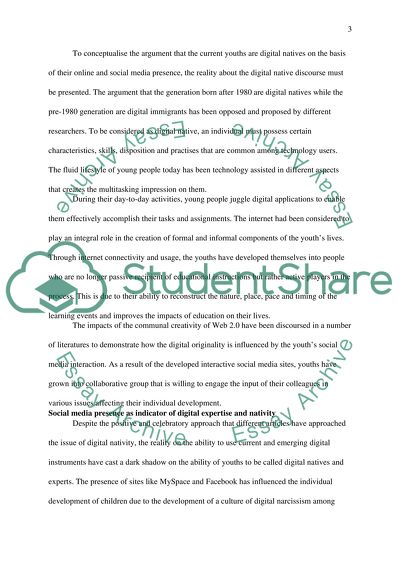Cite this document
(“Is it useful to conceptualise young users of social and online media Essay”, n.d.)
Is it useful to conceptualise young users of social and online media Essay. Retrieved from https://studentshare.org/journalism-communication/1644463-is-it-useful-to-conceptualise-young-users-of-social-and-online-media-as-digital-experts-and-digital-natives-critically-discuss-supporting-your-arguments-with-examples-from-empirical-research-with-young-people-and-online-media
Is it useful to conceptualise young users of social and online media Essay. Retrieved from https://studentshare.org/journalism-communication/1644463-is-it-useful-to-conceptualise-young-users-of-social-and-online-media-as-digital-experts-and-digital-natives-critically-discuss-supporting-your-arguments-with-examples-from-empirical-research-with-young-people-and-online-media
(Is It Useful to Conceptualise Young Users of Social and Online Media Essay)
Is It Useful to Conceptualise Young Users of Social and Online Media Essay. https://studentshare.org/journalism-communication/1644463-is-it-useful-to-conceptualise-young-users-of-social-and-online-media-as-digital-experts-and-digital-natives-critically-discuss-supporting-your-arguments-with-examples-from-empirical-research-with-young-people-and-online-media.
Is It Useful to Conceptualise Young Users of Social and Online Media Essay. https://studentshare.org/journalism-communication/1644463-is-it-useful-to-conceptualise-young-users-of-social-and-online-media-as-digital-experts-and-digital-natives-critically-discuss-supporting-your-arguments-with-examples-from-empirical-research-with-young-people-and-online-media.
“Is It Useful to Conceptualise Young Users of Social and Online Media Essay”, n.d. https://studentshare.org/journalism-communication/1644463-is-it-useful-to-conceptualise-young-users-of-social-and-online-media-as-digital-experts-and-digital-natives-critically-discuss-supporting-your-arguments-with-examples-from-empirical-research-with-young-people-and-online-media.


